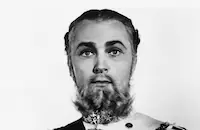My Son, My Son!
Brief Synopsis
Cast & Crew
Charles Vidor
Madeleine Carroll
Brian Aherne
Louis Hayward
Laraine Day
Henry Hull
Film Details
Technical Specs

Synopsis
In 1893, on the eve of his friend Dermot O'Riordan's marriage, writer William Essex bitterly vows that he will someday leave the Manchester, England slum in which he lives and rear a son who will have everything that he himself missed. While looking for new lodgings a short time later, Will defends the baker Moscrop against a bully, and is offered a job by Moscrop and his daughter Nellie. Though he is merely fond of Nellie, Will marries her after her father's death and is content when his first novel is published. When a son, Oliver, is born not long after, Will doats on the boy. Following the success of several more novels, Will has become wealthy enough to buy a summer house on the Cornish coast with Dermot, who has become a prominent cabinet maker. One summer, Oliver lies about stealing a book from Dermot's son Rory. When Will finds out, he covers for the boy, causing a breach with Nellie, who feels that Will's indulgences will ruin Rory's character. Many years later, while Will is working incognito in a coal mine doing research for a new novel, he is asked to pose for noted artist Livia Vaynol. Later that night, they meet on the road to the train station and discover that they have fallen in love. Because Will is not free, however, the two part, not even knowing each other's name. When Will returns home, he learns that Nellie was hit by a car and killed. A year later, Will moves to London to rehearse a play he has written for Maeve, Dermot's daughter. Though Maeve is in love with Will, she hides her true feelings because he thinks of her like a daughter. At the opening night party, Oliver arrives with the "special" girl he has told Will about and Will is shocked to find that she is Livia. Because he thinks that Oliver is also in love with Livia, Will does not want to hurt his son, but Livia helps him to realize that their only happiness will be with each other. When Will tells Oliver that he and Livia plan to be married, Oliver graciously wishes them well, but secretly goes to Livia and lets her know that he intends to continue pursuing her after she becomes his stepmother. Livia becomes increasingly uncomfortable around Oliver, and when, at the summer house, Will finally realizes that advances have been made toward Livia, he confronts Oliver, who then leaves. Soon after, Oliver begins seeing Maeve, who hopes that she can effect a reconciliation between father and son. When World War I begins, Rory and Oliver are sent overseas. On the night that their train leaves London, Will tries desperately to reach Oliver in time to say goodbye, but is too late and is only able to bid Rory goodbye. That same night, Annie, Maeve's maid, goes to Will to tell him that Maeve has become pregnant with Oliver's child. Hoping to help Maeve, Oliver proposes to her, but she refuses, saying that she loves him too much to marry him out of friendship, then committs suicide later that night. As the fighting continues, Will becomes a war correspondent and goes to the front, where he finds Oliver. Though Will tries to talk things over with his son, Oliver, coldly refuses. That night, Rory returns from leave and confronts Oliver with news of Maeve's death. Oliver denies knowing what happened to her, but Rory refuses to believe him and is about to shoot him when Will intervenes, not for Oliver's sake, but for Rory's. As the men leave the next day to go into battle, Oliver returns to see his father once more and the two embrace. Shortly thereafter, Oliver is killed in battle. Some time later, at the summer house, while Rory is visiting Will and Livia, they receive word that Oliver is to be posthumously awarded the Victoria Cross. Rory then tells Will that the night he died, Oliver would have done anything to make his father proud.

Director

Charles Vidor
Cast

Madeleine Carroll

Brian Aherne

Louis Hayward

Laraine Day

Henry Hull

Josephine Hutchinson

Sophie Stewart
Bruce Lester

Scotty Becket
Brenda Henderson

Teddy Moorwood
May Beatty
Stanley Logan
Lionel Belmore
Mary Gordon
David Clyde
Vesey O'davoren
Pat Flaherty
Victor Kendall
Mary Field
Audrey Manners
Sibyl Harris
Connie Leon
Crew
Howard Anderson
Bridgehouse
Don Cash
Lenore Coffee
Fred R. Feitshans Jr.
Stanley Logan
Val Paul
Casey Roberts
John Ducasse Schulze
Earl Sitar
Edward Small
Harry Stradling
Victor Sutker
William Tummel
Grant Whytock

Film Details
Technical Specs

Award Nominations
Best Art Direction
Articles
My Son, My Son
Released by United Artists, My Son, My Son won an Oscar® nomination for John DuCasse Schulze in the category of Best Art Direction, Black-and-White. (The winners that year in that category were MGM's Cedric Gibbons and Paul Groesse for Pride and Prejudice.) The previous year Schulze had been nominated for Best Art Direction/Set Decoration (along with Edward G. Boyle) for The Son of Monte Cristo (1940).
Schulze (1876-1943), who was born in Illinois, began his career as an art director in the early 1920s. Among his 30-odd credits are such titles as The Last of the Mohicans (1936), The Man in the Iron Mask (1939) and Cheers for Miss Bishop (1941).
Producer: Edward Small
Director: Charles Vidor
Screenplay: Lenore J. Coffee, from novel by Howard Spring
Cinematography: Harry Stradling, Sr.
Production Design/Art Direction: John DuCasse Schulze
Original Music: Edward Ward (uncredited)
Editing: Fred R. Feitshans, Jr., Grant Whytock
Costume Design: William Bridgehouse, Helen Taylor
Cast: Brian Aherne (William Essex), Madeleine Carroll (Livia), Louis Hayward (Oliver Essex), Laraine Day (Maeve O'Riordan), Henry Hull (Dermont O'Riorden), Josephine Hutchinson (Nellie Moscrop Essex).
BW-115m.
by Roger Fristoe

My Son, My Son
Quotes
Trivia
Notes
An onscreen prologue, from Samuel II, 18:33 reads: "And the king was moved, and went up to the chamber over the gate, and wept...Oh, my son Absalom...Would God I had died for thee, oh Absalom, my son, my son!" The quotation also provided the inspiration for the novel Absalom, Absalom written by William Faulkner in 1936. According to a news item in Hollywood Reporter on March 25, 1939, producer Edward Small sent critics copies of the script for My Son, My Son! before production began so that they could read it, then offer opinions on the storyline and casting that might benefit the film. A news item in Hollywood Reporter on December 6, 1939, about ten days into production, noted that Scotty Beckett was brought in to replace Darryl Hickman in the role of "Oliver, as a child," because Hickman's illness prevented him from continuing. Actress Laraine Day was borrowed from M-G-M for her role in the picture. The film received an Academy Award nomination in the Art Direction (Black-and-White) category. Brian Aherne, Madeleine Carroll and Louis Hayward recreated their roles in the film for a Lux Radio Theatre broadcast on March 11, 1940.














